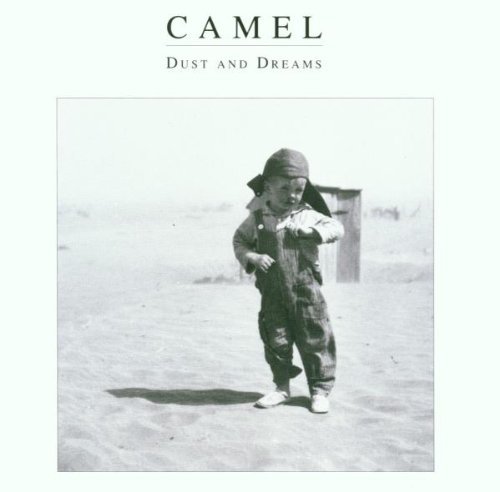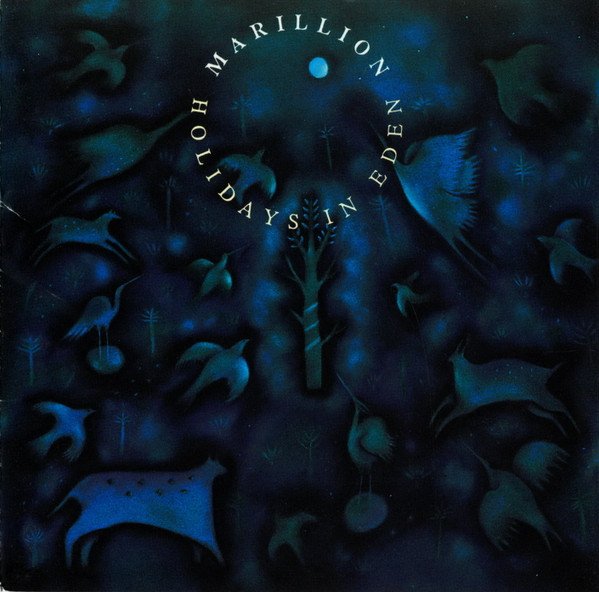Camel - The return of a class act
Camel returned to the fray in the 1990's, after an extended hiatus owing to legal wrangles, with this, the first on their own record label, and what a return it was.
Dust & Dreams is a concept album based upon John Steinbeck's classic novel, The Grapes of Wrath. It is very much the case that if, like me, you were moved to tears by reading the calamities inflicted upon the main characters in that novel, you will appreciate just what a fine job Andy Latimer, ably assisted by his wife Susan Hoover, put in attempting to set the piece to music. For example, the short instrumental, Dusted Out is barren in its beauty, and closing your eyes, you can visualise the scenes that Joad returned to from a spell in prison. The understated emotion, and fine female/male vocal interplay, on the delicate Rose Of Sharon is superb, and Latimer plays a lovely solo midway through and towards the denouement. Listening to tracks such as these, and, indeed, the whole trilogy of albums in that decade, makes one wonder just why on earth the band did not enjoy the huge commercial success that they so thoroughly deserved.
The best symphonic prog has often, rightly, been described as latter-day classical music set to modern instrumentation. Not many better examples can be found than in this and other Camel works. Milk N' Honey, for example, is a superb instrumental piece that describes, in pure orchestration, the promise of a better life out West. Lyrics are not needed. The keyboards by Scherpenzeel and Harriss are easily the equal of anything that the likes of Banks & Wakeman were putting out at this time. The shorter Whispers is quite simply a lovely piece of woodwind led classical interlude.
All of the band play exceptionally well, and Latimer, rightly, steals the show with both his guitar work and a very fine vocal performance. The End Of The Line highlights these multi talents in a nutshell. Nearly seven minutes of symphonic, thoughtful, rock heaven. Meanwhile, his crying guitar more than adequately pictures for us the shock of Cotton Camp. Better still is to come on the haunting Little Rivers And Little Rose, a gorgeous two minute pastiche that leads onto the heavier, angry, well titled Hopeless Anger.
The early, "classic" era, Camel albums, rightly, have a special place in the hearts of fans. However, judging by the relatively few numbers of reviews for this and subsequent albums, I guess that many people had simply lost track of them by this time.
Well, from me, here is a very strong recommendation to go back and complete your collections. This is an excellent album from an excellent band, with sound and production values very much dragged beautifully into the modern era. This work stands up very strongly amongst their finest albums, and just goes to show what heights can be achieved given superb writing, playing, and thoughtful, intelligent interpretation.
ALTOGETHER NOW. YOU WON’T GET ME AS PART OF THE UNION!
ONIONS....OR...I'M OFF PART 3
Following the deserved success of ABWH Part One, the gang reassembled for part two, whilst Yes West floundered somewhat, especially in their efforts to get Roger Hodgson on board with lead vocals, on the rather understandable premise that he was the only vocalist they could find with a similar pitch to Anderson's. Of course, he refused.
Meanwhile, back at the ranch, some Atlantic record company executives though that the world was utterly fed up with two versions of Yes (even though only one was active), and the public would queue up for miles to purchase the glorious fusion of the two versions of the band. A marvellous idea in theory that didn't come anywhere near in practice (in common with most theories).
Wakeman to this day describes this as Onions because it brings tears to his eyes thinking about it, and even listening to the album on a good set of headphones, it's not difficult to see why. For some unknown reason, his contributions to the album are edited to the point where the once mighty lord of all prog keyboardists is reduced to the listener having to strain to hear his parts. Of course, he left soon afterwards, for the third time (although people were starting to lose count).
Is the album as bad as many make out? Probably, but the great shame is that there are enough signs there that show that it could have been fantastic. Without concentrating on each track, there is some decent stuff here.
I Would Have Waited Forever started off marvellously but lacks overall focus. Masquerade is a fantastic acoustic piece by Howe - I wish he played this more often live than the usual fare of The Clap. Silent Talking starts off as a mess of a track, and when Anderson sings It Doesn't Ring True, you realise he probably hasn't sung a truer line. However, after the Howe solo intro to the main body of the song, it is heavenly, with Howe and Anderson reminding us of the reason why we listen to them in the first place.
The Yes West pieces don't come out badly at all. Miracle of Life, especially, is a great track, being a throwback to the trick they played on 90125 of mixing commercial stuff with prog roots. Anderson and Rabin especially shine in their vocal interplay. The More We Live is somewhat similar, but with the difference that Squire is absolutely to the forefront vocally. It is certainly true that Kaye can be heard more than Wakeman on the ABWH tracks, and he provides good backing on this track.
Take the Water to the Mountain is a great track, which features Anderson in finest soaraway vocalist mode.
The rest of the album, though, feels like what it is. A disparate collection of over produced and edited tracks from what were in effect two different bands forced together for commercial reasons. As I write this review, I am listening to Angkor Wat, which should be a glorious fusion and collaboration between Wakeman & Anderson, but which, instead, just sounds messy, the album's principal fault.
After this finished, the resultant tour was, surprisingly, a massive success, with Wakeman & Rabin especially gelling. However, the inevitable breakup soon followed the tour, with Bruford (who excelled on the first ABWH album, but was barely heard on this), Wakeman (for the third time now), and Howe (who stated in an interview with Guitar magazine that No, I'm no Yes man!) all leaving.
Many of us thought that this album marked the end of the band we loved, on an exceptionally low point. In fact, it marked the end of an era for the band, with a new wave to follow.
I cannot believe it is 18 years since this was released, the last Collins era studio album. I can get the fact that it is 34 years since Gabriel left, but this amount of time...I'm getting old.
This album is an important moment in the history of our genre - the last studio LP (discounting CAS) by the most influential (IMO) prog band of all time, and the one band that probably did more to bring the genre to the masses.
Having said that, there are also some fine moments. No Son of Mine is one of THE great Genesis singles, a sharp and focussed track all about family alienation led by some excellent keyboards by Banks, who really returns to form on this LP. The longer, prog, tracks Dreaming While you Sleep and Driving the Last Spike, are also great value for money, both telling real stories and featuring a band who, by now, can play tightly in their sleep.
But the real winner for me on this is the last track, Fading Lights, a song clearly devised by Banks and featuring a crashing, sound filled solo by him in the middle section following a beautifully understated opening section by Collins vocals. This is, unless Phil has another very expensive divorce, the last ever studio recording by this band line up, and, if it is, it is a fine way to go out. At the time it felt like a goodbye, and it is even more now.
This is a fine and noble end to a fine and noble recording career from a band I continue to love to this day.
Easily my least favourite album by my favourite band. I have not changed my mind since this review was written a number of years ago.
I have never liked this album.
I really don't know why - there are some cracking tracks, some of which such as Cover My Eyes and Waiting to Happen are still fantastic rollocking live pieces by the band. Splintering Heart is a fine opener.
I don't know - it is just that the LP does not seem to hold together well and feels disjointed and... well, wrong!
Certainly, the story told in This Town, This Rakes Progress, and 100 Nights are probably forgotten by all except those of us who are completists and fanatics.
It is as if the band were completely unsure of which direction they wished to take. The commercial singles are, in keeping with tradition, fine pieces, especially Cover My Eyes which deservedly charted.
However, Dry Land, and the title track are simply dull and lack any direction at all.
The playing on the LP is as competent as ever, although I feel Rothery was in the background too much.
This was the beginning of the end for the mass commercial appeal of the band, and we all waited with bated breath to see where they would go. A lot, I think, gave up after this LP, which is a shame because you missed some great works afterwards!



